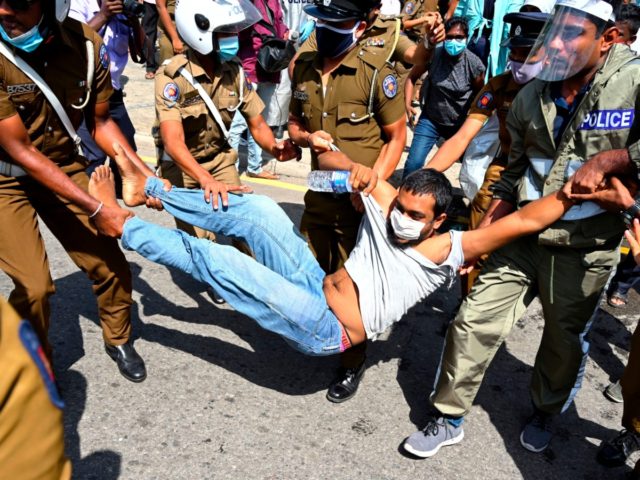Police confirmed the arrests of 53 people in Colombo, Sri Lanka, on Tuesday for participating in a socialist protest against the United States, allegedly a response to the killing of Minnesota resident George Floyd by Minneapolis police.
The Frontline Socialist Party (FSP), a radical leftist organization that uses the communist hammer and sickle as its logo, organized the protest for Monday, but a Sri Lankan court issued an order banning the assembly, noting that social distancing measures in place to prevent the spread of the Chinese coronavirus remain in place and such a protest would violate them. Sri Lanka has documented 1,859 cases of Chinese coronavirus and 11 deaths, but is located near hotbeds of coronavirus spread like India and Indonesia.
The FSP went ahead with the protest on Tuesday, anyway, creating a chaotic scene in front of the American Embassy in Colombo.
Among those arrested was Duminda Nagamuwa, the FSP candidate in the 2019 presidential election and the Party’s official “Propaganda Secretary.” Other senior FSP members were arrested alongside at least two Buddhist monks, reported noted.
Buddhists are the majority population of Sri Lanka and heavily active in politics. Sri Lanka is also home to sizeable populations of Muslims, Christians, and Hindus.
Police Spokesman SP Jaliya Senaratne told reporters that the 53 people detained had violated both a court order and the coronavirus provisions that triggered the order and were facing charges of “breaching quarantine laws and behaving in a manner conducive for the virus to spread.”
The U.S. Embassy clarified in a statement on Tuesday that it did not request that Sri Lanka block the “George Floyd” protest.
“The United States supports the right of Sri Lankans and all people to peaceful protest, which is consistent with our shared democratic tradition” the Embassy asserted.
Those detained were released on bail on Tuesday night. Participants insisted they were adhering to social distancing regulations.
Videos from the event seem to contradict this claim, however, as they show socialists engaging in altercations with police. The country’s Daily Mirror published videos of a melee occurring outside of the embassy.
The FSP invited supporters to surround the U.S. embassy on Monday, prior to the court order, for a protest in George Floyd’s name to, in their words, “oppose state terrorism by U.S. imperialism.” While multiple Sri Lankan governments in the past decade have attempted to strengthen ties to communist China, resulting in the Chinese seizure of the country’s key Hambantota port, the U.S. State Department describes its relationship with Sri Lanka as “positive.”
The FSP, which remains a minority party in Sri Lanka, describes its goal on its website as “endeavoring to accomplish the socialist revolution in the country to organize, train and lineup the proletariats.”
“We believe the proletariat movement of the county never be fragmented from the international proletariat movement. Therefore we are dedicated to build the world proletariat movement in order to conquer the world socialist revolution,” the Party asserts.
Sri Lanka is a South Asian country where ethnicity and religion, not race, fuel much of the nation’s social strife. About 75 percent of the country identifies as Sinhalese, most of whom are Buddhists. Tamils comprise the second-largest ethnic group in the country. The Sinhalese and Tamils fought an over two-decade-long civil war that ended in 2009 with the government defeating the Tamil insurgency. Many of the divides that fueled the war remain present today.
Caught in the middle are the nation’s Hindus and Christians. Sri Lankan Christians are still recovering from one of the deadliest terrorist attacks in the nation’s history, the bombing of six different sites, including three churches, on Easter Sunday 2019. The bombings, for which the Islamic State took responsibility, killed over 200 people, including many young children as the jihadists detonated their suicide vests near them towards the back of the churches. Evidence surfaced in the days following the attack that the government had reason to know of a plot against the nation’s Christians but chose not to act.
The attacks, while targeting Christians, prompted some of the nation’s most prominent Buddhist monks to demand the removal of all Muslims from power. One of those monks, Athuraliye Rathana Thero, went on a hunger strike, resulting in the mass resignations of Muslims from the president’s cabinet in June 2019. Political Buddhist monks also promoted scandalous reports of Muslim doctors allegedly sterilizing Buddhist women without their knowledge, inflaming ethnic and religious tensions.
The incumbent government of Maithripala Sirisena ended in November, triggering an election in which the opposition candidate Gotabaya Rajapaksa was elected president. Rajapaksa appointed his brother, former President Mahinda Rajapaksa, his prime minister. Prime Minister Rajapaksa is widely credited in the country with ending the Sri Lankan Civil War.

COMMENTS
Please let us know if you're having issues with commenting.